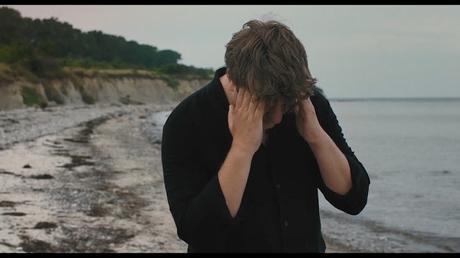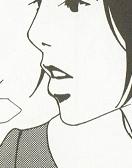
Leon (Thomas Schubert), a writer who found success with his first novel, travels to a holiday home near the Baltic Sea with his friend Felix (Langston Uibel) to finish editing his follow-up, for now awkwardly titled “Clubsandwich”. Things already go wrong before they arrive – their car breaks down in the woods and they have to walk to rest of the way, a process that reveals how different the two of them are, Felix facing the difficulty head-on, while Leon hesitates and complains. When they arrive at the house, they realize that someone else already lives there: Felix’ mom has rented one of the rooms to Nadja (Paula Beer), who remains unseen for a while because she has a busy social life. Again, Leon complains, plagued by concerns about the finishing of his novel, regarding any interruption or unforeseen change in plans as something potentially catastrophic that will derail him. His struggles continue when Nadja, still a ghost-like presence in their life, has loud sex in the next room, disturbing his sleep.
It's a comical introduction to the protagonist of Roter Himmel, a portrayal that continues throughout the film. While the others, including Nadja, once she finally appears in the morning, appear to enjoy their holiday by the sea, Leon broods. Felix and Nadja become fast friends and include Nadja’s sometimes lover Devid (Enno Trebs) in their circle (Devid soon becomes Devid’s lover, a fact that escapes Leon until it becomes auditorily inescapable). They go to the beach to swim, they enjoy meals in the sun, they share stories. Leon, always apart, works – or rather, he uses work as an excuse, spending days on the beach never taking off his black pants and shirt, occupying the arbour but more often than not feeling distracted, unmoored, incapable of finishing his book. The others enjoy the sun, he struggles with mosquitoes. He’s particularly hostile to Devid, perhaps out of some sense of superiority (Devid is a lifeguard, Leon insists on calling he a glorified “pool attendant”, a distinction that is a lot more vivid in German). Paula Beer’s Nadja is luminous, and continuously attempts to include Leon in their activities, trying to zap him out of his moodiness, which fails again and again. Christian Petzold has always been brilliant at portraying characters through what they do (one of my favorite scenes in Transit is the fixing of a radio), both in terms of actions and in terms of occupations, work: in the small house in the woods, Leon does little, while Devid and Felix get to work on re-tarring the roof, a scene in which the distance between the characters is particularly palpable.
Nadja offers to read the manuscript, and after, her opinion of Leon seems irrevocably changed, as if she’s insulted by whatever she has read. We get a glimpse into his writing when his editor Helmut (Matthias Brandt) arrives, and it feels as profoundly self-involved as Leon has been during his stay: even on a few pages, brimming with disregard for the feeling of others, or any self-awareness about what is actually happening. Leon brushes Nadja’s critique aside (after all, she is only an “ice-cream seller”, but as Helmut stays in the house and shows genuine interest in everyone else’s work (Felix is a photographer, Nadja turns out to be just bridging the time before finishing her PhD in comparative literature studies), he realises that he hasn’t bothered to really get to know anyone else, including his best friend.
It's a point that feels like another take on what Anatomy of a Fall unveiled – Leon is a writer, but he appears removed from the life that he is drawing from for his writing. This disinterest in others (or open hostility and arrogance – at one point, he mocks a hotel worker for mispronouncing Uwe Johnson), or even in his own ability to have experiences and live fully, has made his book stale. Then, towards the end of the film, it is almost as if the world aligns to truly show Leon how blind he has been to what surrounds him. Throughout the film, there are hints at an unfolding catastrophe, a forest fire that the local fire service cannot seem to get under control. It’s a hot and dry summer that eventually takes the lives of Felix and Devid, who go out to retrieve the broken down car in a tractor but find themselves engulfed in flames. It’s an unexpected moment of drama that has been sneaking up on the characters, as if the real world in crisis is breaking through their holiday idyll. Leon, confronted with the death of his best friend, and with the realisation that Helmut (who feels like a replacement father for him, a man whose opinion he deeply trusts) has cancer (it’s the final straw for Nadja when Leon fails to put together that Helmut, after a medical breakdown, ends up in the oncology ward of the local hospital), takes a long time to emotionally react to it. He doesn’t cry when he sees the dead intertwined bodies, inseparable in death, he does not cry when Nadja does, and it is only later, alone at the beach, staring at the bio-luminescence of the sea, that he finally breaks down. And of course, everything we have witnessed and that Leon has failed to truly see, ends up being the book he does publish, after shelving his bad one – he has opened his eyes to the world, and finally, things have broken through the barrier and happened to him, but in turn, he’s lost or is going to lose everyone he could have shared his life with.
2023, directed by Christian Petzold, starring Thomas Schubert, Paula Beer, Enno Trebs, Langston Uibel, Matthias Brandt.

